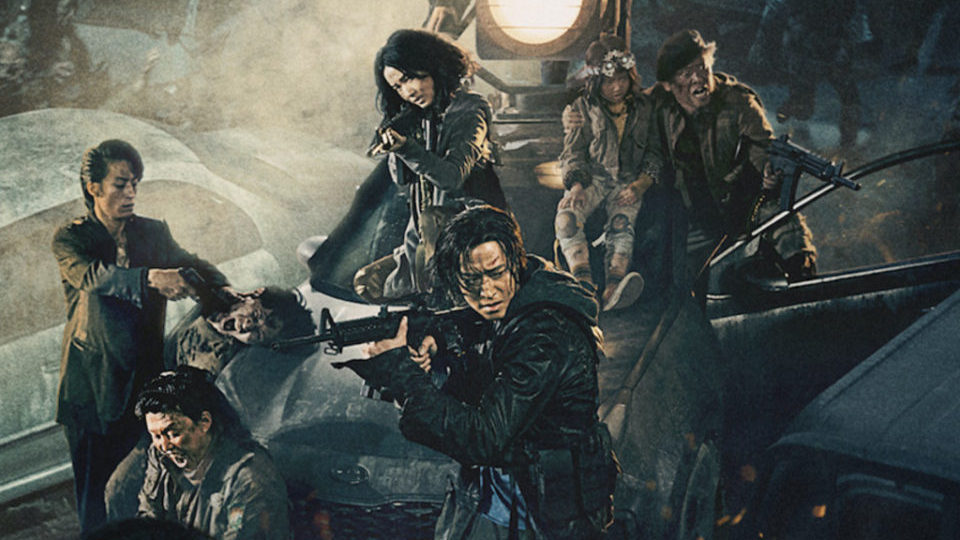Train to Busan came out of nowhere. The elevator pitch, “zombies on a train,” like “snakes on a plane,” or “die hard on a bus,” was so deceptively simple. Trap a group of disparate people in an enclosed environment, introduce an existential threat, and have them fight it, and each other, for their very survival. It didn’t necessarily reinvent the wheel, but what it did was bring to the genre a certain Korean sensibility. Namely, the heightened emotional undercurrent that ran throughout the entire movie. I mean, when was the last time you saw a leading man just break down and ugly stress cry in an American zombie movie?
Zombie fiction, as we all know by now, has very little to do with the undead. For almost a hundred years, filmmakers and writers have used the genre as a thinly veiled metaphor for humanity’s deepest anxieties. From from mass contagion to capitalism. From stoking some deep rooted fear of communism to dealing with the dread of a post-apocalyptic future. At it’s core, however, was always the Sartrean notion of hell being other people.
Train to Busan was an incredibly well crafted piece of cinema that managed to cram all of these ideas into an incredibly entertaining 121 minutes. It gave us an insight into some of the pressing social issues that plagued Korean society. With some K-drama royalty thrown in for good measure.

Peninsula begins four years after the events of Train to Busan. The Korean Peninsula is now a post-apocalyptic wasteland that’s been quarantined from the rest of the world. We learn that Busan wasn’t the safe haven that everyone thought it was, and that both countries, North and South, had fallen prey to the zombie outbreak.
Our hero, Jung-seok, once a highly skilled marine (just watch how deft he is with a gun in those opening few minutes), is now a stateless refugee in Hong Kong. Ostracised for being a “carrier” (and not for his Ekin Cheng hairstyle), he and his fellow castaways live out their lives with the stigma of being Korean.
Opportunity comes knocking when a group of unsavoury underworld types recruit Jung-seok to be a part of a motley crew of (clearly dispensable) Koreans who are smuggled back onto the Peninsula to recover a whole load of money that’s just been left lying about. The deal is simple. Recover all of it and they get to keep half. (Which is pretty good hazard pay if you ask me.)

Now, I know what you’re thinking. This is the perfect setup for a movie that tackles the plight of the refugee. You’re thinking that this zombie heist contrivance is going to be used as a critical examination of how we abuse foreign labour, using them to do the dirtiest of jobs, and viewing them as less than human, even to the extent of being expandable.
Nope. There’s just a lot of shooting. Some really cool car chases. A couple of great hero shots. And plenty of explosions. And you know what? That’s okay. Because Yeon Sang-ho pulls it all of incredibly well.

All three movies in Yeon Sang-ho’s zombie-verse are incredibly different from one another. Seoul Station was a story about dads and daughters set during the onset of an epidemic. Train to Busan was an anti-capitalist diatribe disguised as a zombie movie. And Peninsula is a balls to the wall actioner that has more in common with Mad Max and the Fast and Furious movies than it does with Night of the Living Dead.
Yeon Sang-ho brings the same kind of care and attention to the carnage in this movie that he did with the human drama in Seoul Station, and the social commentary in Train to Busan.
He establishes the rules of this world early on and uses them to great effect. Here, these zombies can’t see in the dark and are highly reactive to sound. And every set piece that follows is cleverly constructed to exploit and subvert those two rules. He uses light and sound as provocations. He uses the zombies as weapons.
In Peninsula, the undead aren’t instruments of fear, but rather symbols of hopelessness and futility. The zombies aren’t the antagonists. They are the environment in which our heroes need to survive.

While I did have some issues with the pacing of the movie – especially the unnecessarily drawn out will-they-won’-they of those last 15 minutes – Peninsula was very much the kind of sequel that I wanted to see.
It is an acknowledgement that the world has moved on from zombies. Since The Walking Dead has already milked the genre for everything it’s worth, leaving all but an empty husk of absurd characters and rejected storylines, I am glad that Yeon Sang-ho decided that the best way back into the franchise was to have some fun.
Peninsula
114 minutes
Director: Yeon Sang-ho
Writer: Park Joo-Suk and Yeon Sang-ho
Cast: Gang Dong-won, Lee Jung-hyun, Lee Re, Kwon Hae-hyo, Kim Min-jae, Koo Kyo-hwan, Kim Do-yoon, Lee Ye-won, and Moon Woo-jin












Follow Us